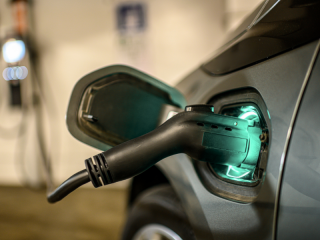
Businesses are increasingly looking to decarbonise their fleets as the ban on the sale of new petrol and diesel vehicles is fast approaching. Various alternative fuels are already on the market, but EV technology is currently the most accessible and popular choice for businesses.
There are now approximately 1 million electric vehicles on UK roads and, with more public charge points than ever before, it’s the ideal time to consider electrifying your fleet.
EV developments
As part of a 2023 survey, we asked our customers if they had any plans to move to EV within 12 months and only 7% said yes. The biggest pain points our customers identified for electric vehicles were:
High purchase costs
Limited vehicle range
Access to infrastructure
However, progress is constantly being made to overcome these challenges to make EVs a more appealing option for fleets.
Whilst EVs still generally have higher upfront costs than traditional ICE vehicles, the running costs tend to be lower, helping businesses to warrant the initial investment.
Driving ranges have increased considerably over the last few years, with electric cars now averaging 220 miles and electric vans averaging 164 miles on a single charge. Although this is still undoubtedly an issue for HGV drivers who travel much longer distances, we’re optimistic that this will also be improved in due course.
The EV infrastructure has been developed to make it more accessible and reliable. There are now over 57,000 public electric vehicle charging points across the UK, 47% more than there were in February 2023, and this number is expected to continue to grow.
The number of EV charging points at home or at workplace locations is even higher, around 700,000, so drivers have plenty of options to choose from. BP has reported that around 70% of the population in Great Britain lives within a 5-mile radius of a BP Pulse rapid or ultra-fast charge point.
As a result of the expanding EV infrastructure, more drivers are now experiencing range confidence instead of range anxiety.
As significant progress has already been made since our customer survey last year, we’re hopeful that more businesses will consider making the switch to electric as the technology and infrastructure is improved even further.
Top 5 reasons to go electric
There are many electric vehicles to choose from and the infrastructure is expanding rapidly, so there’s never been a better time to electrify your fleets. Here are the top 5 reasons why you should go electric:
Fewer carbon emissions – EVs have no tailpipe emissions, making them an eco-friendlier alternative to their ICE counterparts. This helps to reduce air pollution, which is crucial for urban areas, and protects our planet.
Lower running costs – Recharging electric vehicles is normally far cheaper than refuelling with petrol and diesel, particularly if you recharge at home. EVs are also charged less road tax and have a lower Benefit In Kind (BIK) tax, which is financially beneficial for company car drivers.
Charging is quick and convenient – EVs can be recharged in just 20 minutes with ultra-rapid chargers and with thousands of public charge points available, you can recharge quickly and conveniently whilst on the move. Alternatively, you can plug your EV in at home and charge overnight, so it’s ready to go when you need it.
Free entry to low emission and clean air zones – More cities are introducing CAZ to tackle air pollution and EVs are exempt from these charges, saving you money. The benefits are even greater for those in London as EV drivers do not have to pay the Congestion Charge.
Improved brand reputation – Switching to electric vehicles demonstrates your commitment to sustainability which can improve brand reputation and attract more customers and investors to your business. More companies are also registering as “B Corp Certified”, so they must stick to certain green practices and this can impact which suppliers they choose to work with and what vehicles their fleets use.
Apply for an EV charge card
Navigating the various EV charging apps can be confusing, so we’ve introduced two new EV charge cards to make payment simpler.
All you need to do is find an accessible charge point on the Shell Recharge or BP Pulse network, plug in your EV, and then tap the RFID reader with your EV charge card. For added convenience, these cards can also be used to pay for petrol and diesel and all transactions will be clearly displayed on one invoice.
Apply for the BP Fuel and Charge card or the Shell Fuel and EV card today or contact our team if you’d like to discuss your options further.




